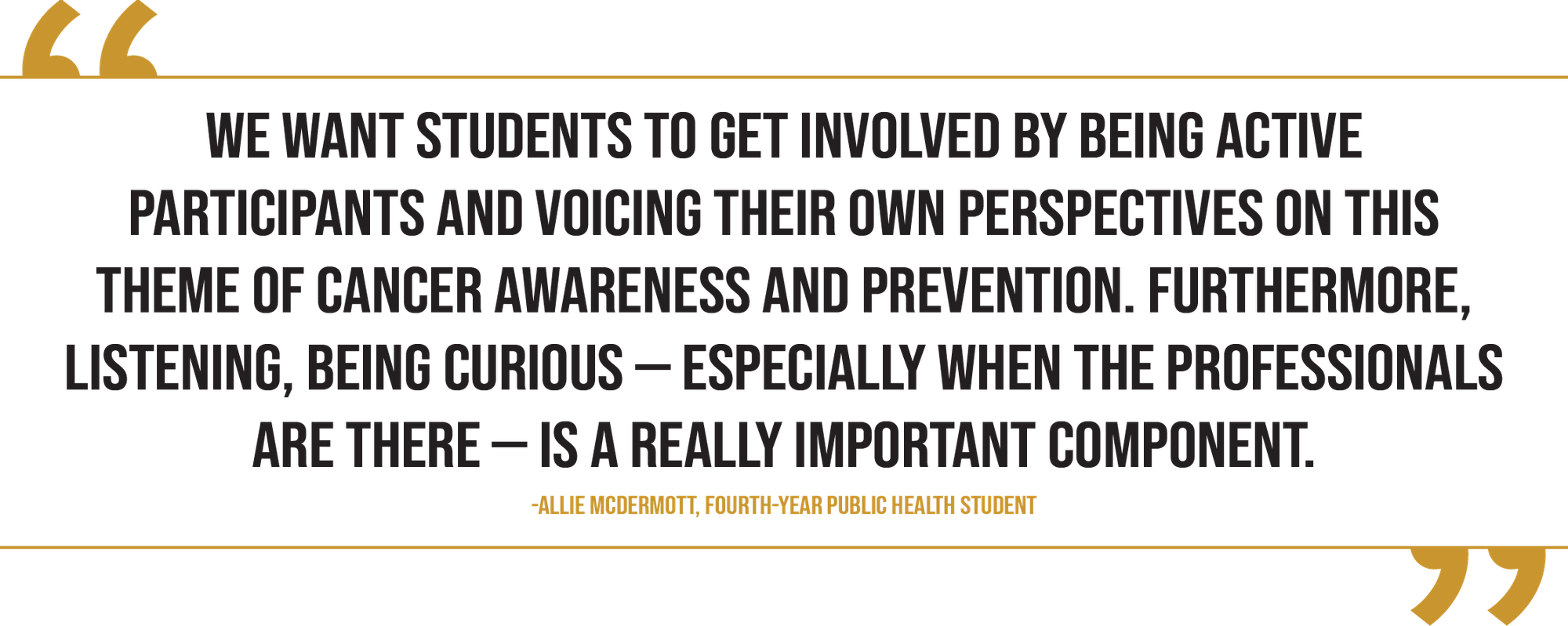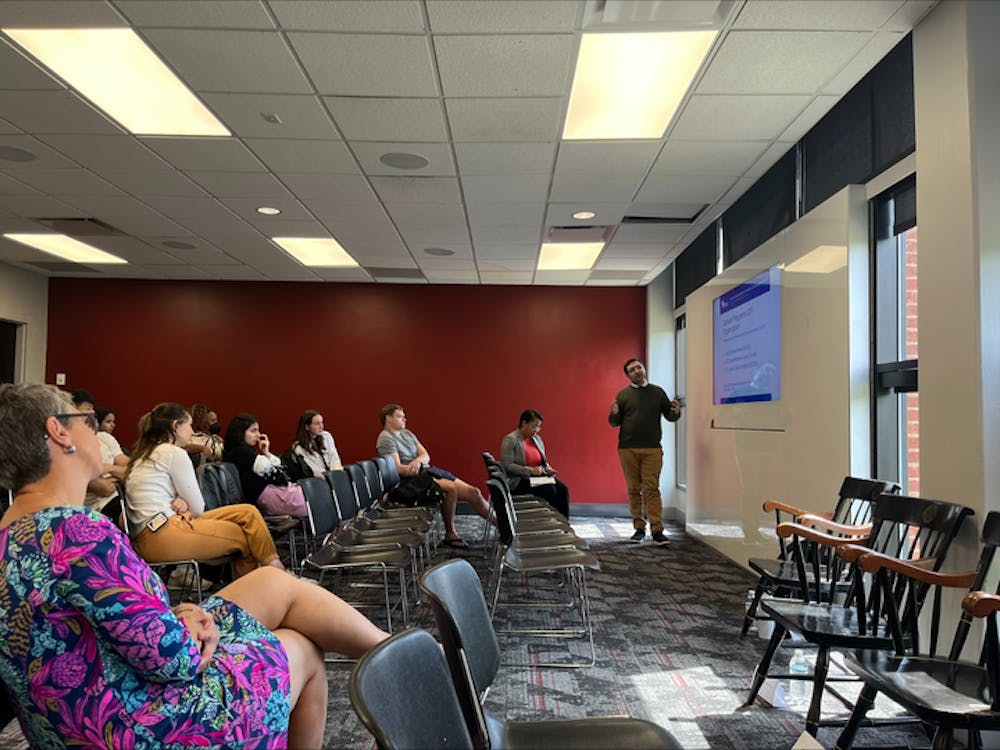The USC Cancer Prevention Coalition is hosting its first annual Cancer Prevention Week from April 1 to 5, featuring a blend of on-campus and virtual events for students to attend.
These events consist of various panels and small-group discussions led by medical experts and coalition partners. Attendees may also participate in active-learning sessions such as morning yoga and guided meditation.
The primary objectives of the event are to explore the fundamental science of cancer and its health implications as well as to promote a deeper understanding of health management through science, lifestyle and community, according to USC's 2024 Cancer Prevention Week project proposal.
An article from the American Cancer Society reported that 2024 is the first year that over 2 million people are projected to be diagnosed with cancer, which is the most in United States history.
Karthik Rangavajhula, a fourth-year biochemistry student and former student senator, said cancer is on the rise among younger populations, particularly in the Southeast, where early-onset cancers are most prevalent.
"Cancer prevention — I mean, it's something that needs to be talked about more, but I don't think it's something that needs to be introduced," Rangavajhula said. "We all understand the risks and importance of cancer. It's just really bringing together everyone's interests and ideas about it and really refining that."
Research institutions such as the University of Exeter are conducting studies on platelet counts in routine blood tests, focusing on early cancer detection and localization. Educating students on how this works can help them better understand the disease and the risks it poses, Rangavajhula said.
"I recently had a blood test, and I didn't know 90% of the stuff that was on there. And I'm sure a lot of people relate to that," Rangavajhula said. "Having that awareness, as well as more of an idea of what the risk of cancer might be, is kind of our goal with the Cancer Prevention Week."
Rangavajhula wrote the bill that established the creation of Cancer Prevention Week at USC, which was passed by the 115th student senate in March. He said the event has garnered significant interest and support from the student senate, and he hopes to integrate cancer prevention into the university culture beyond the current week of programming.
"You can't really go to your friends and talk about colonoscopies with the same level of comfort that you might talk about yesterday's basketball game," Rangavajhula said. "While that is an issue, we want to start to change that by providing safe spaces within our events to begin these discussions."
Throughout the week, small-group discussions as well as yoga and mindfulness classes are scheduled to take place at the Center for Health and Well-Being, said fourth-year public health student Allie McDermott, who is a part of the USC Cancer Prevention Coalition.
Frank Berger, a retired USC biology professor and current emeritus professor in the College of Arts and Sciences, founded and led the Center for Colon Cancer Research from 2002 to 2018. Concerned about rising colorectal cancer rates in individuals under 50, he sought to engage with young people early on and raise awareness among the university community.
"I reached out to the Honors College and said I would like to teach a course on cancer, and this was about a little over a year ago, and they were very open to that," Berger said. "We scheduled a course for this spring, which is ongoing right now. And in that course, it's involved a series of standard lectures so that everybody knew about the basic biology of cancer."
McDermott and Rangavajhula both enrolled in Berger's class, "Communicating the Science of Cancer." Rangavajhula said, through the class, he discussed the concept of cancer prevention with Berger. Together, they aimed to develop a campus-wide event related to cancer awareness and prevention with the help of others.
"When (Rangavajhula) reached out to the class, I ended up sending an email saying I was interested, and then we were able to gather some other students from the class," McDermott said. "We've been moving ever since."
Berger said both Rangavajhula and McDermott were inspired after discovering the rising incidence of cancer among young individuals. They took the initiative to raise awareness among colleagues, peers and students across the university community about the trends in cancer rates among young people, he said.
"We want students to get involved by being active participants and voicing their own perspectives on this theme of cancer awareness and prevention," McDermott said. "Furthermore, listening, being curious — especially when the professionals are there — is a really important component."

Many health professionals, such as members of the South Carolina Department of Health and Environmental Control, Prisma Health and Student Health Center, have partnered with the event. They serve as mediators to facilitate discussions among students, Rangavajhula said.
Berger said the events are discussion-based in order to provide attendees with an optimal space to learn. Facilitators guide discussions on how attendees can communicate with their peers, doctors and families as well as raise awareness. The aim is to promote awareness, answer questions and foster a greater understanding of the issue, he said.
"I think (this initiative) will make a positive impact because it is not a lecture — it's a conversation. And it's through discourse that students will be empowered," McDermott said. "It's a conversation that they have to take part in, and it gives them an opportunity to voice some of their concerns, if any, perspectives, confusions, curiosities, and that's why I think it'll be impactful because it's active participation."
While there may be a limited number of pre-health students at USC, the topics discussed during the week will impact every student's health awareness, regardless of major, and help prepare them for the future, Rangavajhula said.
"I think the topics that we'll be discussing here aren't exciting by any means. They are pretty somber, but I think they're important conversations that need to be had just so that students won't have to face these types of topics firsthand, 20 years down the line, when they realize they have stage four cancer and they could have done a lot to potentially prevent it earlier on," Rangavajhula said. "We want to give students that opportunity to take charge of their own health as well as a better understanding of what exactly it means to be healthy."
This event provides students with an opportunity to engage in discussions about one of the leading diseases in the U.S. alongside peers who share similar perspectives from diverse backgrounds, McDermott said.
"I don't think people who graduate will have similar opportunities," McDermott said. "It's definitely worth your while. It is such a great opportunity to engage with other students and really represents the importance of college education in that way."

